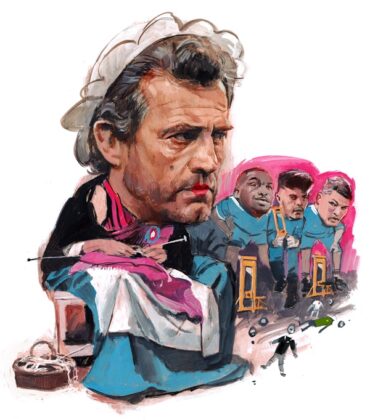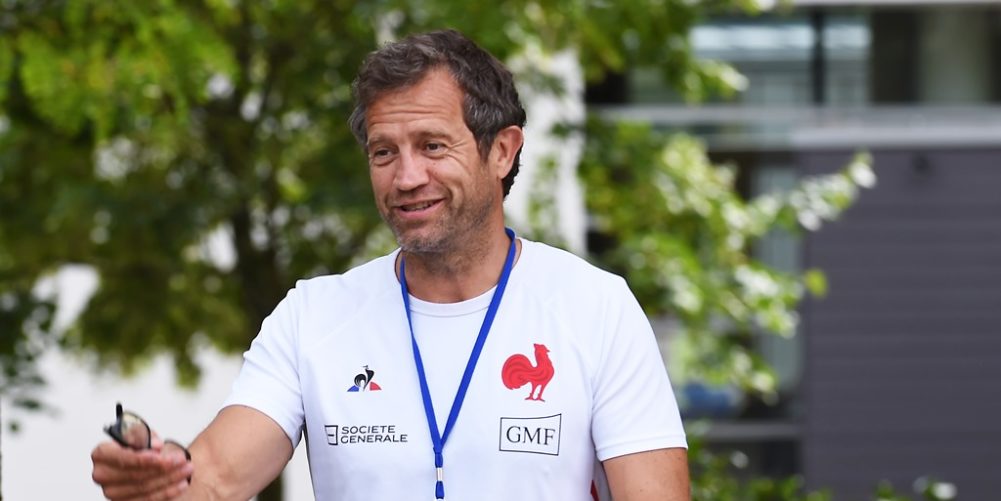NOT many international coaches have the guts to name a bunch of novices for the Six Nations, but that is what Fabien Galthie did this week when he named a 42-man squad to start his reign as France coach.
Given that 19 of them are uncapped, it is crystal clear that Galthie, who was embedded in the French 2019 World Cup camp as a consultant coach to his predecessor, Jacques Brunel, was deeply unimpressed by what the incumbent generation of French pros had to offer in Japan.
As a result, Galthie, who was appointed as Brunel's replacement before the tournament, axed 22 of the 36 players France utilised in a campaign that ended in the quarter-finals after a narrow defeat by Wales.
Of the 14 Galthie retained, Charles Ollivon received the biggest promotion when the coach named the rangy Toulon blindside flanker as France captain for the 2020 Six Nations.
At 6ft 5ins Ollivon has something of Andy Ripley about him – especially a high-knee running action – and his rip-roaring charge for a try that threatened to put Wales out of the tournament in Oita highlighted his athleticism.
Galthie described him as a natural leader. He added: “He is often the first person to put his body on the line – he leads by example.”
That is all fine and dandy before the first shots of the Six Nations are fired, but ultimately it is results that dictate how captains – and coaches – are judged.
Galthie endorsed the World Cup centre pairing of Gael Fickou and Virimi Vakatawa, which gave a France midfield punch against the Welsh they have long been lacking. He also kept hard-grafting No.8 Greg Aldritt, loose-head props Jefferson Poirot and Cyrille Baille, hooker Camille Chat, lock Bernard Le Roux, scrum-half Baptiste Serin, winger Damian Penaud, and full-back Thomas Ramos.
Other than that, the most predictable recalls were for the three French 2018 Junior World Cup winners, scrum-half Antoine Dupont, fly-half Romain Ntamack, and tight-head Demba Bamba, who had already made their mark after being promoted to full Test level by Brunel.
However, this three-man advance guard of junior world champions has now been augmented by a whole lot more. These include hooker Julian Marchand (Toulouse), loose-head Jean-Baptiste Gros (Toulon), lock Killian Geraci (Lyon), flanker Cameron Woki (Bordeaux-Begles), fly-half Louis Carbonel (Toulon), and centre/wing Arthur Vincent (Montpellier).
The upshot is that Galthie – who has been appointed through to the 2023 World Cup hosted by France host – has selected a squad with an average age of 24, in which the only player over 30 is Le Roux.
It is so inexperienced that Ollivon, who is one of the old hands at 26, has only 11 caps, and it is the same with Aldritt. The likes of Penaud (16), Vakatawa (21) are only marginally more seasoned, there are only three players around the 30 Test mark in Poirot and Serin (both 33), and Chat (26), while the senior forward, Le Roux, has only 37. In fact, the only player to cross the 50 Test threshold is Fickou (51), first capped at 18 and still only 25.
Add to that a few more players with at most a smattering of caps between them – with the recalled Racing wing Teddy Thomas (16) the best known – and the risk factor rises incrementally.
Galthie is taking a hell of a gamble, because, talented as they are, that is a whole raft of inexperience – and one that could capsize, leaving the coach in deep water.
It is also a brave move in which Galthie, and his manager, Raphael Ibanez, both of them decorated former French captains, have decided to put their reputations on the line to bring an end to a decade of mediocrity.

France last won the Six Nations title (and Grand Slam) in 2010, and it has been followed by a nine year slump in which Les Bleus have finished in the bottom half of the table on all but two occasions. By comparison, in the previous decade France won the title four times, including two Grand Slams.
The calls for a clear-out intensified a year ago when the revered former Test flanker Olivier Magne called for Brunel to turn to youth to get France out of the rut. He said: “We have a generation that has basked only in defeat – we will not win anything with it.”
It was a view endorsed by Pierre Mignoni, the former France No.9 who is currently coaching Top 14 leaders Lyon, who said: “What is the risk? We lose games anyway, we will not be worse, so let players learn and gain experience.”
Galthie has taken up the gauntlet, but is this is a grand gesture which lays the foundations for a French renaissance, carrying them to a first World Cup triumph, or one which collapses amid a welter of Gallic recriminations?
There is no doubt that Galthie and Ibanez are French ‘rugbymen' of true substance, and they have shown it in an unprecedented decision to by-pass a generation of players they consider lack the professionalism required to be successful at international level.
Fortune favours the brave, and Galthie has some young gems who can shine just as brightly as the half-back pairing of Dupont and Ntamack, and the blockhouse Bamba.
The red-haired lock Geraci stood out like a beacon at U20 level, and is the sort of mobile, in-your-face competitor that is at the heart of all great packs.
Then there is the Jonny Wilkinson fly-half clone, Carbonel.
So much about the young Toulon youngster is reminiscent of his English idol, not just in appearance, but also in resolve. Carbonel is already a very accomplished goal-kicker and game-manager who keeps opponents under constant pressure.
It is too much to expect that Galthie's young assassins will immediately guillotine England in Paris, and then repeat it by giving the chop to England in Paris, Wales in Cardiff and Scotland in Edinburgh before going on to take a few prized southern hemisphere heads.
However, it is not too early to predict that over the next four seasons France will again become a formidable force under the tutelage of Galthie, their new “Madame Guillotine”.


























